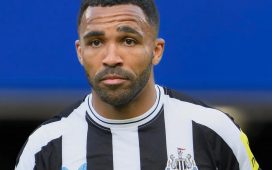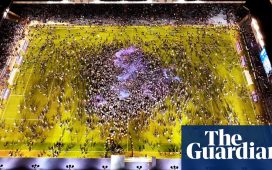It counted as an emergency when, one day this summer, the Berlin district of Köpenick awoke to find itself daubed in blue. Overnight a group of Hertha fans had journeyed out here, to the German capital’s easternmost reaches, and made liberal application of their club colours. Such an affront required swift action. “It wasn’t good,” Marcel Smolka remembers. “Some of their ultras came down and put paint here, stickers there. But ours put it right with red and white when we saw what had happened. They made it better straight away.”
Everyone knew that what appeared an act of mild antagonism, a tickle on the belly from one set of fans to another, actually signified something greater. Hertha’s supporters had bothered to venture this far because Union Berlin now mattered again. They begin their first season in the unified Germany’s Bundesliga on Sunday, when RB Leipzig visit, and suddenly everything is up for grabs in a city for which top-tier football battles are a fading memory. No team from its old east has ever made it this high; history has been made and uncharted waters bring new tests.

For Smolka and his friends the matchday routine will be much the same as ever: drinks at Abseitsfalle, the bar round the corner from the Stadion An der Alten Försterei – the stadium at the old forester’s house – followed by 90 minutes’ uncompromising support in the Waldseite – the forest side – behind the goal. For those further afield the terms of engagement will change. Once feted primarily for their anti-establishment bearings and intensely involved fan culture, Union Berlin rarely made significant headlines on the pitch before overcoming Stuttgart in a grippingly tense play-off on 27 May. To some extent they liked it that way. But now things have got serious and the football itself is, more than ever, what gets people talking.
“It has to be,” says Michael Parensen, their longest-servingcurrent player, who joined from Köln when Union were a third-tier club in 2009, helping them to an instant promotion. “If it’s not, then you won’t achieve anything. In our first two or three years in 2 Bundesliga it was more: ‘Yeah, it’s nice to be here but we’ll see what happens,’ and that made it quite comfortable to play here. Then I think we reached a point where that was not enough; we needed to have more.
“There were people who were happy to stay at that level but others said: ‘No, we have to push on.’ In the last few years the thought was in a lot more people’s heads. For me this attitude can still change a little bit more because some people are like: ‘Ah, I don’t like to have all the stuff related to the top level, let’s stay where we are and do our own thing.’ There was a change in mentality but for me it could still be bigger.”
That is the tension Union must now master: establishing themselves as a strident Bundesliga outfit without sacrificing what, even by German standards, is a unique atmosphere at the altar of mammon. It is one reason Parensen, now 33 and a bit-part player, agreed to sign a new contract despite knowing he will feature irregularly.
“It’s going to be important for the supporters to see that not much is different,” he says. “I think I can be a point where they see: ‘OK, the club is not changing at all.’ My main role is to keep up the atmosphere in the locker room, as one of the most important factors in our success last year was the supportive environment.”
You have to be a specific kind of person to play for Union, he thinks, and newcomers have not always got up to speed. “Some things are quite different here. You have to give more of your own to help the club, or help other players; you put your own effort in to get things done. It’s quite special and some players have come in and had problems with the work ethic.”

They never lasted long. In his first few months at Union Parensen saw the extent to which everyone mucks in. Headlines were made globally when, in order to meet requirements for a third-tier licence, more than 2,300 supporters took it on themselves to help rebuild a dilapidated stadium. Christian Arbeit, the club’s long-serving PA announcer and press officer, remembers 7am starts and the sight of six professional builders looking to put together teams that would work on specific sections. “They’d ask the professions of their team: ‘Teacher, nurse, car salesman, cinema guy…’” he says, but the job was done and, whether or not by coincidence, that was the season Union’s rise kicked on.
It is a well-told story, just like the time in 2004 when the “Bleed for Union” campaign saw fans give blood to raise money and avert bankruptcy. For Union, struggle always tended to be a fact of life; one that stemmed from fighting the GDR’s status quo and never really went away. Ralf Zimmermann sits opposite Smolka and his cousin, Stefan, in Abseitsfalle and remembers the days in the 1980s when Union, playing against Dynamo, the Stasi favourites, in East Germany’s top flight, knew they could never win.
“It was like in a horse race where you have one great horse and an old one, and you can hand over your money beforehand,” he says. “When we sang together in those games we felt strong. Even if you were afraid, you’d sing more and more, despite the fact there was a lot of hate in the songs and they had people in the crowd. We knew the Stasi guys from their clothes. Sometimes they pulled people out of the stadium and interrogated them; I knew people who ended up in prison.”
The stadium was a transgressive space; one that intoxicated a young and unworldly Arbeit, too. “I was fascinated by the wildness and kind of freedom,” he says. “I’d never seen adults singing and shouting in public. When we had a free-kick and the opponent formed a wall we’d cry: ‘The wall must come down!’ I’d stand there as a little kid and think: ‘What, no police coming?’”
That sense of defiance hung by a thread through the immediate post-reunification days when Union, the state apron strings cut and with no money-making nous whatsoever, sank to the fourth tier and had to grub around in front of 800 fans on weekend mornings. “I was really afraid things would collapse at that point,” Zimmermann says. But Union rose again. The fervour inside the stadium – fierce, constant, unstintingly optimistic and dizzyingly close for unsuspecting opposition players – has never really been diluted and the imperative now is to make sure the Bundesliga’s bright lights do not turn a cult destination into a tourist trap.
Zimmermann’s childhood dream was for Stadion An der Alten Forsterei, three of whose stands are still given over to old-fashioned terracing, to resemble Anfield; an ambition that may not look unrealistic when, as planned, the 22,000-capacity stadium upgrades to 37,000. But that brings risks: atmospheres themselves are ripe for monetising and, even on the Kop, camera phones and selfie sticks are inescapable. Smolka points out that, if anyone in the Waldseite is spotted making over-eager use of a phone or recording device, they are politely shown another part of the stadium from which to deploy it.

Union’s supporters are used to self-policing and the club has promised to do its best elsewhere. While there is no pretence that a slick commercial operation does not exist to maximise revenues away from the pitch, what Arbeit describes as “our holy 90 minutes” will remain untouched by advertisements and promotions, while ticket prices have been frozen. “Our message to the fans has been: ‘If you don’t change, we won’t either; if you trust in us, we trust in you,’” Arbeit says, echoing a promise made by the club’s president, Dirk Zingler, after their ascent. It is, on the face of things, a remarkable contract; its effectiveness will be tested fully if on-field success and rising interest – 9,000 new members have signed up to the club since March – continue apace.
They might do if Urs Fischer, who has transformed their fortunes since taking over as head coach in 2018, continues to work his magic. “He makes everyone in the team feel important,” Parensen says. Fischer gathered his squad last winter and asked whether they felt a new striker was required; it is a fittingly collaborative approach, although he has sought to give them a fighting chance this season by signing some players with proven Bundesliga experience, such as Neven Subotic and Christian Gentner, this summer.
The mere thought of walking out against RB Leipzig – the club brought into existence in 2009 by the makers of Red Bull – gives Parensen visible goosebumps. He has waited a long time but on this occasion it may take a while for the atmosphere to warm up. “None of us wanted Leipzig in our first game, and then look what happened,” Smolka says. He, Zimmermann and the rest of their supporters’ group, FC Schluckauf 82, will join everyone else in remaining silent for the first 15 minutes, in protest against opponents whose origins could hardly differ more starkly from their own. “The fans have the club on their side,” Zingler said this week.

They will reinforce their own history in the process. The “finally there” march will see supporters carry banners bearing photographs of dead, Union-supporting relatives to the ground on Sunday. Zimmermann would have loved to symbolically show his late brother, who introduced him to the club as a 12-year-old in 1972, what is going on but explains he later became a Hertha fan. “He did not go through all the suffering I went through,” he says. At Union ideals and identity come with no middle ground.
“There is still east and west [Berlin],” Zimmermann says. “The heart of the East German football fan lies here. We want to emerge from our ‘sleeping beauty’ status. Hertha had a banner saying ‘the capital’s club’ but you will never see that here.”
In reality Union stress anybody who admires the club’s values and wants to offer active support is very welcome. But there will be no attempt to water down and represent an entire city. Those splashes of blue graffiti may yet become a regular hindrance. “You cannot deny history; the city has developed in different ways,” Arbeit says. “We don’t behave like everyone’s darlings.”














